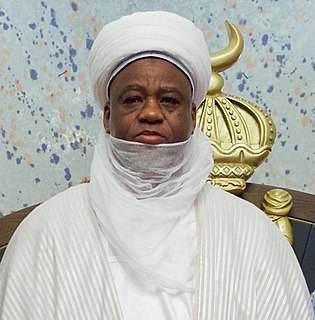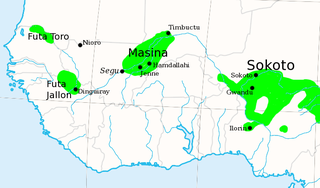
Sokoto is a city located in the extreme northwest of Nigeria, near the confluence of the Sokoto River and the Rima River. As of 2006 it has a population of 427,760. Sokoto is the modern-day capital of Sokoto State.

The Sokoto Caliphate was an independent Islamic Sunni Caliphate, in West Africa. Founded during the jihad of the Fulani War in 1804 by Usman dan Fodio, it was abolished when the British defeated the caliphate in 1903 and put the area under the Northern Nigeria Protectorate.

Northern Nigeria was an autonomous division within Nigeria, distinctly different from the southern part of the country, with independent customs, foreign relations and security structures. In 1962 it acquired the territory of the British Northern Cameroons, which voted to become a province within Northern Nigeria.

Alhaji Sir Ahmadu Bello KBE was a Nigerian politician who was the first and only premier of the Northern Nigeria region. He also held the title of the Sardauna of Sokoto. Bello and Abubakar Tafawa Balewa were major figures in Northern Nigeria pre-independence politics and both men played major roles in negotiations about the region's place in an independent Nigeria. As leader of the Northern People's Congress, he was a dominant personality in Nigerian politics throughout the early Nigerian Federation and the First Nigerian Republic.
Ibrahim Muhammadu Maccido dan Abubakar, often shortened to Muhammadu Maccido, was the 19th Sultan of Sokoto in Nigeria. He was the son and primary aide to Siddiq Abubakar III (1903–1988) who had been the Sultan of Sokoto for 50 years. Maccido served in many functions of government during his life and served most prominently as the liaison to Nigerian President Shehu Shagari until a military coup removed Shagari from power. When his father died in 1988, the head of the military government in Nigeria, Ibrahim Babangida appointed Ibrahim Dasuki as the new Sultan of Sokoto, a decision which caused large-scale, violent protests throughout northern Nigeria.

Sultan Muhammadu Sa'ad Abubakar is the 20th Sultan of Sokoto, the titular ruler of Sokoto in northern Nigeria, head of Jama’atu Nasril Islam, and president-general of the Nigerian National Supreme Council for Islamic Affairs (NSCIA). As Sultan of Sokoto, he is considered the spiritual leader of Nigeria's seventy-million Muslims, roughly fifty percent of the nation's population. Sa'adu Abubakar succeeded his brother, Muhammadu Maccido, who died on ADC Airlines Flight 53, the flight crashed shortly after takeoff from Nnamdi Azikiwe International Airport and had been destined for Sokoto.

The First Republic was the republican government of Nigeria between 1963 and 1966 governed by the first republican constitution.
Sir Usman Nagogo dan Muhammadu Dikko was Emir of Katsina from May 19, 1944, until his death. He succeeded his father, Muhammadu Dikko, as emir, and was succeeded by his son, Muhammadu Kabir Usman.

The Provinces of Nigeria are a former administrative division in Nigeria, which were in use in Colonial Nigeria and shortly after independence; from 1900 to 1967. They were altered many times through their history. They were divided into divisions, some of these were further subdivided into native authorities. Northern Nigeria and Southern Nigeria were also sometimes known as the Northern Provinces or Southern Provinces respectively. Currently Nigeria uses states as its administrative division.

The Fulajihads were a series of jihadist wars that occurred across West Africa during the 18th and 19th centuries led largely by the Muslim Fula people. The jihads and the jihad states came to an end with European colonization.
Although the majority of the Nigerian Muslim population is Sunni, there is a significant Shia minority, particularly in the northern states of Kano and Sokoto. However, there are no actual statistics that reflect a Shia population in Nigeria, and a figure of even 5% of the total Nigerian Muslim population is thought to be too high “because of the routine conflation of Shi’a with Sunnis who express solidarity with the Iranian revolutionary program, such as those of Zakzaki’s Ikhwani.”
Abba Musa Rimi is a Nigerian politician who was elected Deputy Governor of Kaduna State, Nigeria in October 1979 during the Nigerian Second Republic, becoming acting governor when the Governor Abdulkadir Balarabe Musa was impeached on 23 June 1981. He was elected on the platform of the People's Redemption Party.
Islamic extremism is adherence to a fundamentalist interpretation of Islam, potentially including the promotion of violence to achieve political goals. In contemporary times, Islamic extremism in Northern Nigeria is typified by the Boko Haram insurgency and the proselytizing campaigns of salafist groups like the Izala Society.
Ibrahim Dasuki was the 18th Sultan of Sokoto, who was deposed in 1996 during the military government of Sani Abacha. Prior to becoming Sultan, he held the traditional title of Baraden Sokoto. Dasuki was the first Sultan from the Buhari line of the house of Dan Fodio. He was a close associate of Ahmadu Bello, a friend of Abubakar Gumi and was influential in the founding of Jama'atu Nasril Islam.
Aliyu Makama Bida (1905–1980), MHA, CMG, CFR, OBE, was a Nigerian politician. He was the first Northern Minister of Education and Social Welfare, and later Minister of Finance and Treasurer of the NPC.
JNI is the Java Native Interface, a Java programming framework.










